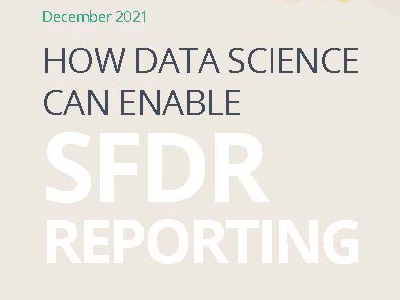

A closer look at portfolio sustainability. (Photo by grapestock / iStock)
When Bloomberg reported earlier this year that ESG assets were on track to be worth $52trn by 2025 – more than a third of the total forecast for worldwide assets under management – it will have reflected a direction of travel familiar to most wealth managers.
In recent years, they have found themselves having to deal with new client demands and expectations when it comes to ESG priorities, with establishing best practices and the standards for reporting, many high net worth individuals (HNWIs) have come to expect that this is still something of a work in progress.
“Stakeholder expectation for ESG products are increasing and it’s not enough any more to say ‘I have ESG in my process’; investors have to demonstrate real-world impact,” cautions Rodolphe Bocquet, VP of partnerships and regulation at Clarity AI, a sustainability tech platform that delivers insights on the social and environmental impact of over 30,000 organisations.
“We are shifting away from the ESG integration, which has been the dominant approach of the last ten to 15 years, to impact investment. And that requires new approaches, new methodologies and higher standards.”
And the clock for wealth managers is ticking. “Last year there were more net inflows into ESG ETFs [exchange-traded funds] in Europe than into non-ESG ETFs,” says Bocquet. “As the European Union regulation unfolds, close to four out of five institutional investors plan to stop purchasing non-ESG products by the end of 2022 [according to PwC’s ‘2022 – The Growth Opportunity of the Century’ report].”
Establishing a clear view
This leads to the second hurdle confronting the wealth management industry: implementation and measurement. “ESG data and ratings suffer from very strong limitations – limitations in data quality and limitations in data coverage,” says Bocquet, who was global head of sustainable investment at Qontigo, a subsidiary of the Deutsche Börse Group, prior to joining New York City-headquartered Clarity AI earlier this year.
Right now, wealth managers have no comprehensive but transparent and flexible solution to turn to when assessing the impact of their portfolios and funds. Consequently, some specialist providers have developed highly sophisticated proprietary tools for integrating ESG into their reporting, but the vast majority rely on unique data providers or the self-reported filings of the market entities – some of which may be incomplete or benefit from further independent scrutiny and comparison.
Bocquet cites the EU’s ‘Study on Sustainability-Related Ratings, Data and Research’, which found that between 2019 and 2020 the size of ESG specialist teams in asset managers had doubled. “Investors feel the need to increase their in-house expertise on that topic in order to stay competitive,” he says.
And it’s only going to become more complex with increased regulation: “From the regulator point of view there is increasing scrutiny to avoid greenwashing by asset managers on both sides of the Atlantic,” cautions Bocquet.
Increasingly, it’s not just the regulators who are anxious to pinpoint and eradicate greenwashing, but also investors themselves. This requires a far higher level of accountability and granular detail across one’s investment portfolio.
Leveraging the best in tech
“Through using machine learning and artificial intelligence technologies, Clarity AI provides a fact-based approach that is powered by data science that allows us to provide more reliable data on the one hand and then to expand it at scale on the other,” explains Bocquet.
The platform covers 30,000 companies, as well national and corporate bonds, and can provide users with aggregate sustainability scores for entire portfolios right down to individual stocks. Moreover, the sustainability scores are broken down into scores at pillar, category and subcategory levels – and can be checked against different sustainability frameworks, such as ESG financial risk, product exposures, climate, or the contribution to the UN’s Strategic Development Goals.
“We give full transparency on the data so we don’t provide just a score, which is a black box,” says Bocquet. “We explain what the components of the score are and to what extent they contribute to the aggregated score, where the data is coming from, whether it’s reported or estimated data, and, if it’s estimated, our level of confidence of that estimation.”
Navigating the complexity
As well as helping wealth managers to determine the sustainability performance of investment portfolios, the transparency that this platform brings offers reassurance to customers who are more than ever used to being presented with data.
“Over the last five years there’s been a complete shift in the volume and granularity of what is required by the market,” says Bocquet. “There is a revolution under way. It’s making things more complex but there is also a lot more intelligence that is going into this domain, to providing answers for questions that investors face. We should not shy away from that complexity but instead provide investors with affordable solutions that allow them to navigate it in an efficient and scalable way.”
And whether it’s family office principals or next-gen clients asking the questions, the fact is that wealth managers need the authoritative answers. “You can see now in these family offices there is a shift,” says Bocquet. “This new generation, they’re very demanding on alignment of their investments and their values, which is adding pressure.”
The good news is that solutions now exist to help wealth managers meet this client demand. “Technology allows us to make available solutions that were, years ago, only available for very sophisticated investors,” says Bocquet. “What we do at Clarity AI just didn’t exist five years ago – the scope of assessment we provide, the level of integration, the coverage of financial assets – it’s unprecedented.”
Bocquet believes wealth managers have no excuse not to embrace change and the opportunity that comes with it. “It’s challenging but solutions are becoming available and more and more at scale,” he says. “If you want to remain competitive and bring the value to your clients that they are requiring, the ability to integrate sustainability into the way you operate as a wealth manager – it is really becoming a licence to operate.”
Learn more about why harnessing the best in tech can provide investors with new levels of reliability and transparency in ‘How Data Science Can Enable SFDR Reporting’.







